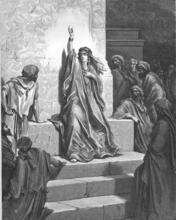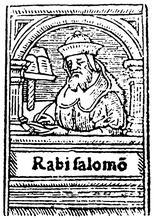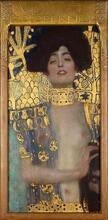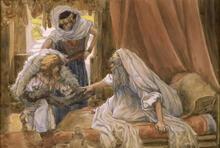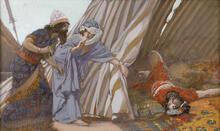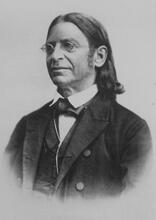Deborah 1: Midrash and Aggadah
Rebekah’s nurse Deborah died when Jacob was on his way to the Land of Canaan, close to Bethel, where she was buried under a tree. The rabbis describe her as having a close relationship to Jacob and as a confidante of Rebekah, following Jacob to Haran at Rebekah’s request.
The Death of Deborah
Rebekah’s nurse Deborah died when Jacob was on his way to the Land of Canaan, close to Bethel. She is mentioned by name only once in the Torah she-bi-khetav: Lit. "the written Torah." The Bible; the Pentateuch; Tanakh (the Pentateuch, Prophets and Hagiographia)Torah, in Gen. 35:8, in the description of her burial under an oak tree that was named “Allon-bacuth [the oak of the weeping].” Deborah is also mentioned, anonymously, in Gen. 24:59, when she accompanied Rebekah on the latter’s journey to the Land of Canaan to wed Isaac: “So they sent off their sister Rebekah and her nurse,” as was fitting for a wealthy and distinguished family that retained a nurse.
In the midrashic depiction of Deborah’s departure from Paddan-aram, Abraham’s servant took Rebekah and her nurse Deborah and mounted them on the camels. They set out from Rebekah’s house in the middle of the day (the sixth hour of the day). So that the servant would not be alone with Rebekah at night, he experienced kefizat ha-derekh (the miraculous shortening of the way), and after only three hours they arrived in Hebron, at the time of the afternoon Minhah prayer. Isaac, who had gone out “to meditate in the field” (Gen. 24:63) and recited the Minhah prayer, saw the approaching camels (Pirkei de-Rabbi Eliezer [ed. Higger], chap. 16).
The Tree of Deborah
The nurse enjoyed special standing among the handmaidens and maids, even after the infant in her charge had been weaned. The special mention of Deborah’s death and burial teaches that she maintained this standing in the household of Jacob, as well. The A type of non-halakhic literary activitiy of the Rabbis for interpreting non-legal material according to special principles of interpretation (hermeneutical rules).midrash asks how Deborah could have returned with Jacob from Paddan-aram, since she was the handmaiden of Rebekah, who lived in the land of Canaan. The answer given is that when Jacob fled to Haran, Rebekah assured him (Gen. 27:45): “Then I will fetch you from there.” Rebekah kept her promise and sent to summon Jacob, but he did not want to leave Laban’s house. What did she do? She dispatched Deborah to bring him (cited by Rashi on Gen. 35:8, in the name of R. Moses Darshan; see also Midrash Statements that are not Scripturally dependent and that pertain to ethics, traditions and actions of the Rabbis; the non-legal (non-halakhic) material of the Talmud.Aggadah [ed. Buber], Gen. 35:8). This exegesis indicates that Deborah was Rebekah’s confidante, on whom she relied to bring Jacob back to the land of Canaan without Esau’s knowledge. Despite Deborah’s advanced age, she was the only one found suitable for this task.
“Allon-bacuth,” the tree under which Deborah was buried, reflects the ancient practice of interring the dead under trees. According to one Rabbinic exegetical tradition, it was given this name because Jacob sat and wept over the death of his nurse Deborah. When God saw his grief, He revealed himself to him to comfort him (i.e., the consolation of mourners), as is said in Gen. 35:9: “God appeared to Jacob […] and He blessed him” (Tanhuma [ed. Buber], Hayyei Sarah 2). This midrash does not understand the phrase “Rebekah’s nurse” as the nurse of Rebekah herself, but as that of Rebekah’s children. According to this conception, Deborah joined Rebekah before the latter’s marriage, in order to be the nurse of her future children, which would explain why the Torah took note of Deborah’s death and burial, since Jacob was attached to her and greatly mourned her passing.
The Death of Rebekah
Another midrashic tradition attributes the weeping and great sorrow to an additional death that occurred at that time: the passing of Rebekah. This tradition reads the word alon as the Greek word, meaning “another,” and “alon bakhut” as “another weeping.” While Jacob was in mourning for Deborah, word reached him of the death of his own mother (Gen. Rabbah 81:5). Rebekah’s death is not mentioned in the Torah, and the Rabbis find an allusion to this event in the death of Deborah (see the entry: Rebekah). Yet another tradition has the word “bakhut” referring to Jacob’s redoubled weeping: once for Deborah, and once for Rebekah (Eccl. Rabbah 7: 2:3). God acted compassionately with Jacob and revealed Himself to him in order to bless him with the mourner’s blessing for the death of his mother (Gen. Rabbah 81:5).


